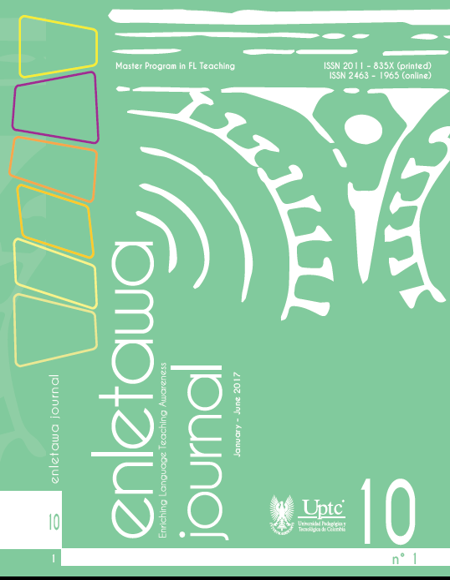Reflections on student-centered learning: An alternative to traditional English classes

Abstract
This article presents some methodological reflections about student-centered learning in order to achieve the Colombian National Standards for Bilingual Education in English classes in an elementary school context. It also discusses the need to raise teacher awareness, understanding of these methodologies, and the need to change teachers´ beliefs and behaviors in the classroom. Findings show that student-centered learning is an alternative for teachers, and it should be included in schools’ Proyecto Educativo Institucional (PEI) in order to achieve bilingualism. Furthermore, it allows students to explore, practice and increase their autonomy and self-confidence in using a foreign language.
Keywords
student-centered, English as a foreign language, education policy
References
Abel, E. M., and Campbell, M. (2009). Student-centered learning in an advanced social work practice course: Outcomes of a mixed methos investigation. Journal Social Work Education, 28(1), 3-17.
Al tablero. (2005 October – December). Retrieved from https://wwwmin educacion.gov.co/1621/propertyvalue-32266.html
Altinyelken, H. (2010). Curriculum change in Ugando: Teacher perspectives on the new thematic curriculum. International Journal of Educational Development, 30 (2), 151-161.
Bonilla Carvajal, C. A., and Tejada Sanchez, I. (2016). Unanswered questions in Colombia´s foreign language education policy. PROFILE Issues in Teachers´- Profesional Development, 18(1), 185-201.
Bremner, N. (2015). Reculturing Teachers as Just the Tip of the Icerbg: ongoing Challenges for the implementation of Student-centered EFL learning in Mexico. MEXTESOL, 39(3).
Cárdenas, M. (2006). Retos del Programa Nacional de Bilingüismo. Retrieved from: https://www.academia.edu/2575639/Retosdel Programa NacionaldeBiling%C3%BCismo._Colombia_Biling%C3%BCe
Contreras Leon, J. J., and Chapeton Castro, C. M. (in press). Transforming EFL classroom practices and promoting student’s empowerment: Collaborative learning from a dialogical approach. PROFILE Issues in Teachers´ Professional Development, 19(2).
Cubukçu, Z. (2012). Teachers’ evaluation of student-centered learning environments. Education, 1, 49-66.
Fullan, M. G. (2007). The new meaning of educational change. London: Cassell.
Gómez Sará, M. M. (2017). Review and analysis of the Colombian Foreign Language bilingualism policies and plans. HOW, 24 (1), 139-156.
Grosjean, F. (2010). Bilingual: life and reality. London: Harvard University.
Herazo Rivera, J. D., Jerez, R. S., and Lorduy Arellano, D. (2012). Opportunity and incentive for becoming bilingual in Colombia; implicatons for programa nacional de bilingüismo. íkala, Revista de Lenguaje y Cultura, 17(2), 199-213.
Lorenz, K. (1965). Evolution and modification of behavior. Chicago. University of Chicago Press.
Ministerio de Educación Nacional de Colombia. El programa nacional de bilingüismo (2004). Retrieved from http://www.mineducacion.gov.co
Ministerio de Educación Nacional de Colombia. Bases para una nación bilingüe y competitiva. (2005). Retrieved from http://www.mineducacion.gov.co/1621/propertyvalue-32266.html
Ministerio de Educación Nacional de Colombia. Estándares Básicos de Competencias en Lengua Extranjera: Inglés. Formaren lenguas extranjeras: inglés. (2006). Santafé de Bogotá: Imprenta Nacional.
Ministerio de Educación Nacional (2014a). Orientaciones para la implementación de proyectos de fortalecimiento del inglés en las entidades territoriales. Bogotá. Retrieved from http://www.colombiaaprende.e du.co/ht m l/m ic r o sit io s/1752/articles-315518recurso5.pdf
Ministerio de Educación Nacional, (2014b). Colombia very well! Programa Nacional de inglés 20015-2025 (Documento de socialización). Bogotá. Retrieved from http://www.colombiaaprende.edu.
co/html/micrositios/1752/articles-343287recurso1.pdf
Moyer, A. (1999). Ultimate attainment in L2 phonology. The critical factors of age, motivation and instruction. Studies in Second Language Adquisition, 21(1),81-108.
Mufwene, S. S. (2010). Globalization,global English and world English:Myths and facts. En N. Coupland (Ed.), The handbook of language and globalization (pp. 31-55). Malden: Wiley-Blackwell.
Programa Nacional de Inglés 2015 – 2025 ‘Colombia, very well’. Archivo de la presidencia. (2014, August 2). Retrieved from http://wsp.presidencia.gov.co/Prensa/2014/Julio/Paginas/20140710_05 -Programa-Nacional -de- Ingles -2015 -2025 -Colombia-very-well-pondra-a-hablaringles-a-los-colombianos.aspx
Sayer, P. (2015). “More & Earlier”: Neoliberalism and Primary English Education in Mexican Public Schools. L2 Journal, 40-56.
Schweisfurth, M. (2013). Learner-centered education in international perspective: whose pedagogy for whose development? London: Routledge.
Wedell, M. (2009). Planing educational change: putting people and their context first. London: Continuum.